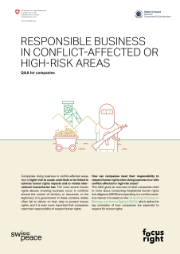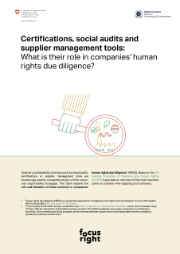- Practical guide to identify and address the worst forms of child labour in mineral supply chains
- Children's Rights and Business Atlas
- Guidance for the commodity trading sector
- Responsible business in conflict-affected or high-risk areas – Q&A for companies
- Certifications, social audits and supplier management tools: What is their role in companies’ human rights due diligence?
Child labour
Practical guide to identify and address the worst forms of child labour in mineral supply chains

The OECD has developped measures to assist companies in addressing the risks of the worst forms of child labour in thier mineral supply chains. The following guide builds on the OECD Due Diligence Guidance:
Practical actions for companies to identify and address the worst forms of child labour in mineral supply chains
Children's Rights and Business Atlas
The “Children's Rights and Business Atlas” was developed by UNICEF together with the Global Child Forum and published in November 2018. The atlas is designed to help companies easily identify their actual and potential child rights risks and integrate child rights into their corporate due diligence practices and policies.
Commodity trading
Guidance for the commodity trading sector
.png)
On 28 November 2018, the Federal Department of Foreign Affairs (FDFA) and the State Secretariat for Economic Affairs (SECO) launched a Guidance on Implementing the UN Guiding Principles on Business and Human Rights in the commodity trading sector (PDF, 3 MB, 01.11.2019). This best practice guide, produced together with the London-based Institute for Human Rights and Business (IHRB), is the result of a public consultation with NGOs, the private sector and the Geneva cantonal authorities
Conflict-affected and high-risk areas
Responsible business in conflict-affected or high-risk areas – Q&A for companies

This Q&A gives an overview of what companies need to know about conducting heightened human rights due diligence (HRDD) and operating in a conflict-sensitive manner. It is based on the UN Guiding Principles on Business and Human Rights (UNGPs) and was jointly developed by swisspeace and focusright within the frame of the Swiss National Action Plan for Business and Human Rights (NAP) on behalf of the Swiss Confederation. It provides practical advice for companies that are connected to conflict-affected or high-risk areas along their value chain.
Certifications and social audits
Certifications, social audits and supplier management tools: What is their role in companies’ human rights due diligence?

What is the role of voluntary sustainability schemes such as certifications, social audits and supplier management tools in companies' human rights due diligence? How can they contribute and what are their limitations? This Q&A provides recommendations to companies on how to apply such initiatives as part of their due diligence.





